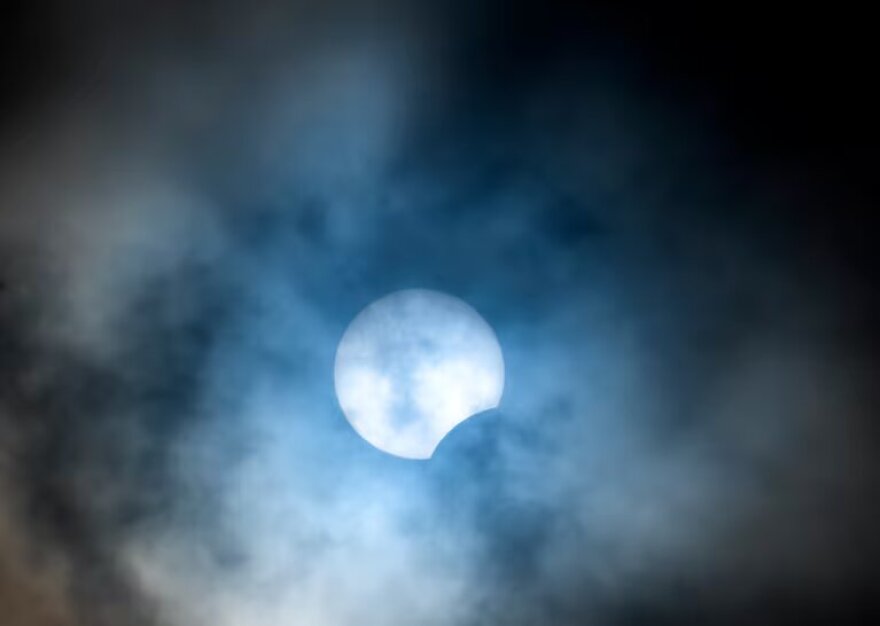Oregonians from all four corners of the state looked skyward Monday, to witness the solar eclipse — even though it was only partial.
In towns like Portland, where clouds blocked the view, they still gathered in their hundreds.
“It’s a phenomenon whether we saw a little tiny chunk or not,” said retiree Donna Bestwick, wearing eclipse glasses outside the Oregon Museum of Science and Industry.
“We’re just here to enjoy! It doesn’t happen very often and you’ve got to get out and do it.”
Bestick’s friend said it helped her place herself within the spinning arms of the solar system.

The event lasted just under two hours and looked substantially different across the state. While only 23% of the sun was blocked in Portland, 33% was missing in Jordan Valley, in Oregon’s southeastern-most corner.
OMSI’s director of space education, Jim Todd, said many watchers did not seem to care if it was cloudy. They could still catch a glimpse of the phenomena in between cloud breaks.
“People are fascinated with it,” Todd said. “They love to follow it and it’s also very rare.”
The turnout for this year’s eclipse was substantially smaller in Oregon than in 2017 when parts of the state had a full view of a total eclipse. The Associated Press reported that parts of the country with a full view of the celestial event experienced the traffic jams, packed hotels and excitement that comes with major eclipses.
Landscaper, Micah Beck, brought his telescope to OMSI so people could get a closer look, maybe even watching sunspots through the solar filter.
“I grew up in the shadows of pyramids in the Midwest, so archeological astronomy was the door to astronomy for me,” Beck said, referring to geological features near the Illinois-Missouri border.
He loves to see things that place him within the universe.
“I guess it’s like a navigation thing,” Beck said. “Knowing where you are, anywhere on the Earth, by the oldest map above us.”

NASA said the next total solar eclipse in the US will be in 20 years, on August 23, 2044.
A trip to totality
Whether it was due to memories of the 2017 eclipse or just the excitement of seeing something new, some Oregonians weren't content to stay home and instead, traveled to parts of the United States that were in the path of totality.
Jenette Kime of Springfield said she and her spouse planned their entire vacation around the event. They feared, after reports of possible tornados and large hail, they might not be able to drive to a safe place to watch it.
But when they arrived in Killeen, Texas, the clouds cleared just in time. They joined a small group of other onlookers.
"It's so emotional, and it gets completely dark in a matter of seconds, and the birds stop chirping," she told KLCC by phone after the eclipse. "And then you see this amazing sun that's coming out from behind the moon...it's so hard to explain. It's gorgeous, the most gorgeous thing. Everyone has to experience this.”
Kime said she’d been planning the trip for years, since the Pacific Northwest was in the path of totality in 2017. She said she’s already thinking about a trip to Spain to catch the next solar eclipse in 2026.
KLCC's Rebecca Hansen-White contributed to this report.
Copyright 2024 Oregon Public Broadcasting and KLCC




